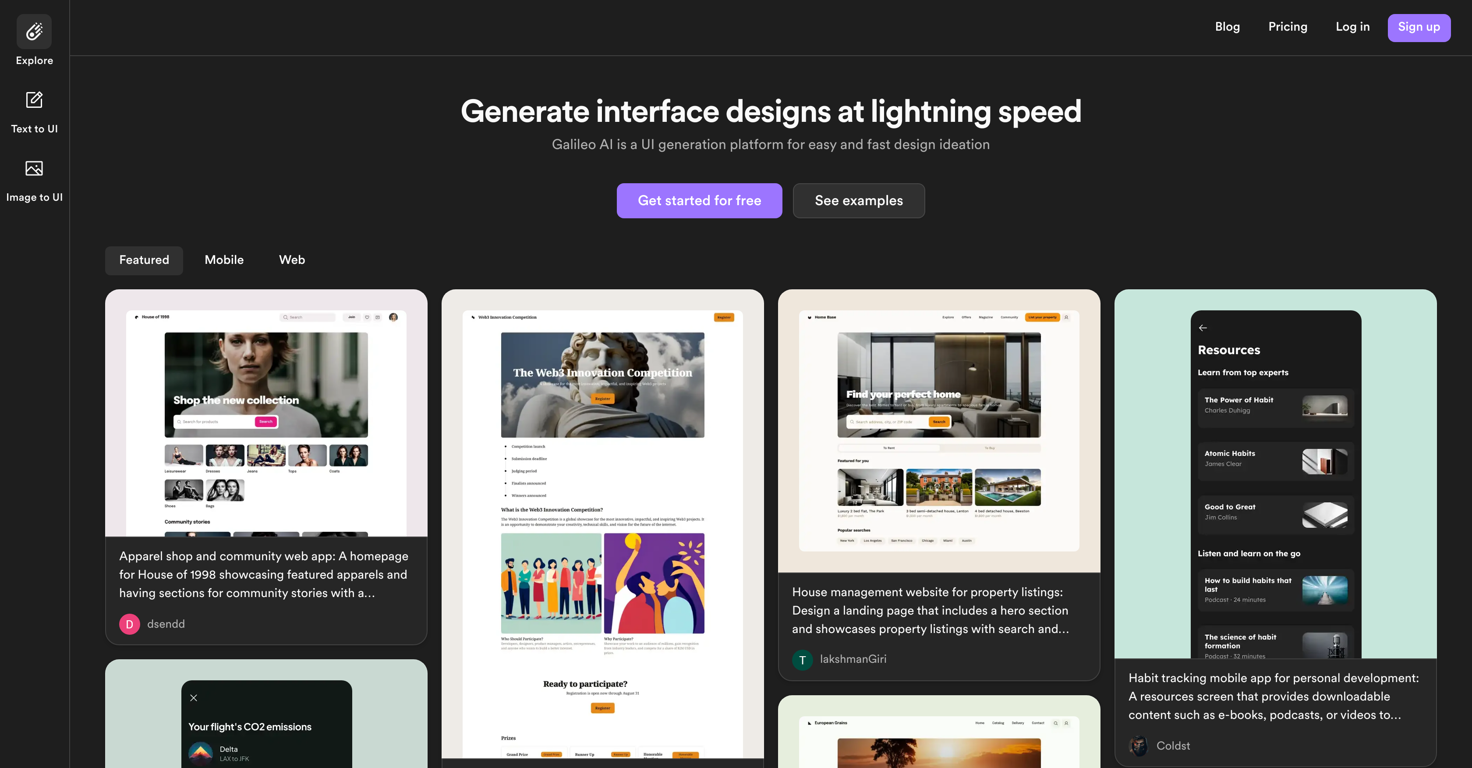
Galileo AI Design Tool: Complete Buyer's Guide
AI-powered mockup generator for rapid prototyping
Galileo AI Design Tool is an AI-powered mockup generator that converts text and image inputs into editable UI designs, positioning itself as a specialized rapid prototyping solution for AI design professionals. The platform distinguishes itself through text-to-UI and image-to-UI generation capabilities trained on thousands of existing designs[47][49].
Market Position & Maturity
Market Standing
Galileo AI occupies a specialized niche within the broader AI design tool ecosystem, focusing specifically on AI-powered mockup generation while established design platforms integrate AI features incrementally[47][49].
Company Maturity
The vendor operates in an emerging AI category where market maturity indicators suggest significant growth potential, though specific market share data requires verification from accessible sources.
Growth Trajectory
Growth trajectory indicators include expanding customer base and positive customer feedback patterns, though specific revenue growth and funding status data require verification from accessible sources.
Industry Recognition
Industry recognition emerges through customer testimonials and G2 platform reviews highlighting platform effectiveness, though formal analyst recognition and awards require verification from accessible sources[52].
Strategic Partnerships
The platform's focus on Figma integration suggests strategic alignment with established design workflow ecosystems rather than attempting to replace comprehensive design platforms[48][51].
Longevity Assessment
Longevity assessment indicates sustainable business model alignment with market needs, particularly for teams requiring consistent rapid prototyping capabilities.
Proof of Capabilities
Customer Evidence
Customer implementation evidence demonstrates measurable efficiency improvements across documented use cases. Organizations report prototype development compressed to 2-day cycles versus traditional 5+ week timelines[50].
Quantified Outcomes
Performance validation from customer testimonials on G2 platforms consistently highlights platform effectiveness[52].
Case Study Analysis
Use case validation spans multiple design scenarios including mobile application prototyping, web dashboard creation, and marketing landing page generation[49].
Market Validation
Market adoption patterns show successful implementation among UX/UI designers conducting rapid prototyping, non-designers requiring UI mockup generation, and product managers working within constrained design budgets[49][55].
Competitive Wins
Competitive validation emerges through differentiated positioning against established alternatives. While competitors like Uizard focus on wireframe-to-prototype conversion and Visily specializes in marketing template mockups, Galileo AI's complex UI generation from minimal inputs creates documented competitive advantages for teams requiring rapid concept exploration[39][47][49].
Reference Customers
Reference customers include design professionals who report that 'Galileo makes all the effort that is required in assessing and prototyping much easier'[52].
AI Technology
Galileo AI's core technology centers on advanced text-to-UI and image-to-UI generation capabilities that convert natural language descriptions or reference images into editable mockup designs[47][48][49].
Architecture
The platform functions as a cloud-based service with minimal technical infrastructure requirements, though comprehensive design workflow management depends on existing Figma integration capabilities[48][51].
Primary Competitors
Primary competitors include Uizard (wireframe-to-prototype conversion focus), Visily (marketing mockup specialization), and Smartmockups (template-based approach with Adobe Creative Cloud integration)[39].
Competitive Advantages
Competitive advantages center on text-to-UI and image-to-UI generation capabilities that distinguish from wireframe-focused competitors or template-based alternatives[39][47][48].
Market Positioning
Galileo AI occupies a specialized niche within the broader AI design tool ecosystem, focusing specifically on AI-powered mockup generation while established design platforms integrate AI features incrementally[47][49].
Win/Loss Scenarios
Win/loss scenarios favor Galileo AI when organizations prioritize rapid prototype generation over comprehensive design suite capabilities, have established Figma workflows, and require consistent UI concept generation[47][49][51].
Key Features

Pros & Cons
Use Cases
Integrations
Pricing
Featured In Articles
Comprehensive analysis of AI Visual Mock Test Tools for AI Design for AI Design professionals. Expert evaluation of features, pricing, and implementation.
How We Researched This Guide
About This Guide: This comprehensive analysis is based on extensive competitive intelligence and real-world implementation data from leading AI vendors. StayModern updates this guide quarterly to reflect market developments and vendor performance changes.
55+ verified sources per analysis including official documentation, customer reviews, analyst reports, and industry publications.
- • Vendor documentation & whitepapers
- • Customer testimonials & case studies
- • Third-party analyst assessments
- • Industry benchmarking reports
Standardized assessment framework across 8 key dimensions for objective comparison.
- • Technology capabilities & architecture
- • Market position & customer evidence
- • Implementation experience & support
- • Pricing value & competitive position
Research is refreshed every 90 days to capture market changes and new vendor capabilities.
- • New product releases & features
- • Market positioning changes
- • Customer feedback integration
- • Competitive landscape shifts
Every claim is source-linked with direct citations to original materials for verification.
- • Clickable citation links
- • Original source attribution
- • Date stamps for currency
- • Quality score validation
Analysis follows systematic research protocols with consistent evaluation frameworks.
- • Standardized assessment criteria
- • Multi-source verification process
- • Consistent evaluation methodology
- • Quality assurance protocols
Buyer-focused analysis with transparent methodology and factual accuracy commitment.
- • Objective comparative analysis
- • Transparent research methodology
- • Factual accuracy commitment
- • Continuous quality improvement
Quality Commitment: If you find any inaccuracies in our analysis on this page, please contact us at research@staymodern.ai. We're committed to maintaining the highest standards of research integrity and will investigate and correct any issues promptly.